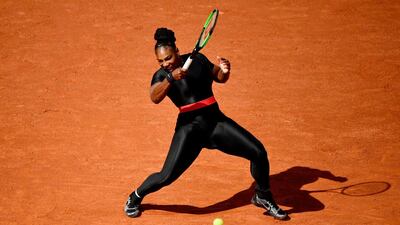In the space of as many days, France has shown up in the media for two very different cases related to women's clothing. The first was French Tennis Federation president Bernard Giudicelli banning American tennis player Serena Williams from wearing a uniform of her choice.
The second was the United Nations Human Rights Council calling out France for restricting religious freedom for a Muslim woman. Two cases that are ostensibly very different – but which raise larger queries around women, what they dress and who gets to restrict them.
The two cases are quite dissimilar but in their own ways, raise very crucial points. After Williams wore a black catsuit at this year's French Open tournament, she told reporters: "I feel like a warrior in it, a warrior princess – from Wakanda, maybe," referring to the movie Black Panther. She also had a very functional reason for it. She had recently faced issues with blood clots and suits that included leggings assisted her health.
One would have thought that if nothing else, the presence of such a health reason would have been sufficient to redirect would-be critics' attention elsewhere. But not in Williams' case. One can only speculate as to why that might be – whether the fact Williams comes from an ethic minority and a woman has anything to do with it. No one can tell for certain but many will be wondering and with good reason.
But beyond the pondering of gender and race in this particular episode, there is an issue of respect at play. Williams is one of the most well-known sportswomen of her generation and brings a great deal of talent to the game.
There was absolutely no need for Mr Giudicelli to publicly issue a demarche of this type – and in so doing, he expressed a certain amount of disrespect, a disrespect that is difficult to uncouple from the broader context of a white, upper class male telling a woman of colour to dress in a different way.
The implicit accusation was that Williams didn’t respect the game by dressing as such but on the contrary, her putting her talent to good use does respect the game. Arguably, the disrespecting of one of the game’s most well-known players is far more disrespectful to tennis than anything Williams has done.
But without generalising about France needlessly, there is a pattern that is difficult to ignore, not simply over the last few weeks or months but years. It was not so long ago that French security officials were filmed forcing a woman (also of colour) in a wetsuit in Nice to uncover, enforcing a ban against so-called burkinis.
The infamous foulard affair over the wearing of hijabs to schools in the 1980s and 1990s is well-known and is often used in discussions around the world by liberal political theorists as an example of how not to do secularism.
But it is not every day that the United Nations itself publicly calls out France, a self-proclaimed bastion for liberal universal values, for its lack of respect for individual autonomy or religious expression.
The UN Human Rights Council did precisely that, however, last week – and while the statement is not binding, it does necessitate a response.
_____________
Read more from HA Hellyer:
Muslim communities need to find a new way to join discourse on human rights
We are witnessing the birth pains of a new and vile authoritarianism in Syria
One joke at a time: how the Arab world is (slowly) tickling its funny bone
_____________
If the French political elite continues to follow the same pattern it has done thus far, they will posit that the rest of the world simply doesn’t understand its challenges, nor does it understand how the logic of its values is constructed on issues like the headscarf and the integration of Muslim communities in France.
Increasingly, however, that defence is less tenable. The rise of the far right across the continent, the popularisation of many of its key issues by more centrist parties and the wave of populism around the world offers more convincing explanations.
And that explanation plays into not only issues such as the homing in on what a black woman might wear during a tennis game – even when it is arguably far more appropriate, if only for health reasons, than the usual attire –and censuring what a Muslim woman might choose to wear in a nursery. (And one can only imagine the uproar that might happen if Williams decides one day to wear a catsuit with a scarf.)
It also speaks to the fact that around the world, there persist people in positions of authority who dislike admitting that their "norm" is not as universal as they might want to fool themselves into thinking. And the line between that kind of thinking and the rise of the mainstreaming of bigotry in so many places around the world is not so difficult to draw.
Dr HA Hellyer is a senior non-resident fellow at the Atlantic Council in Washington, DC and the Royal United Services Institute in London

